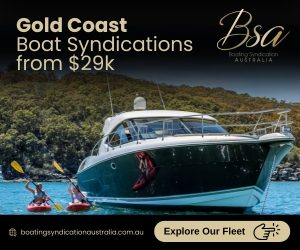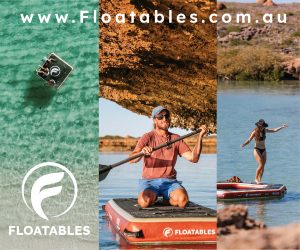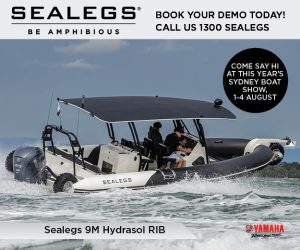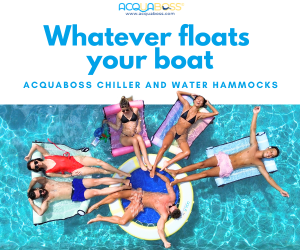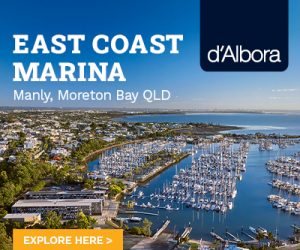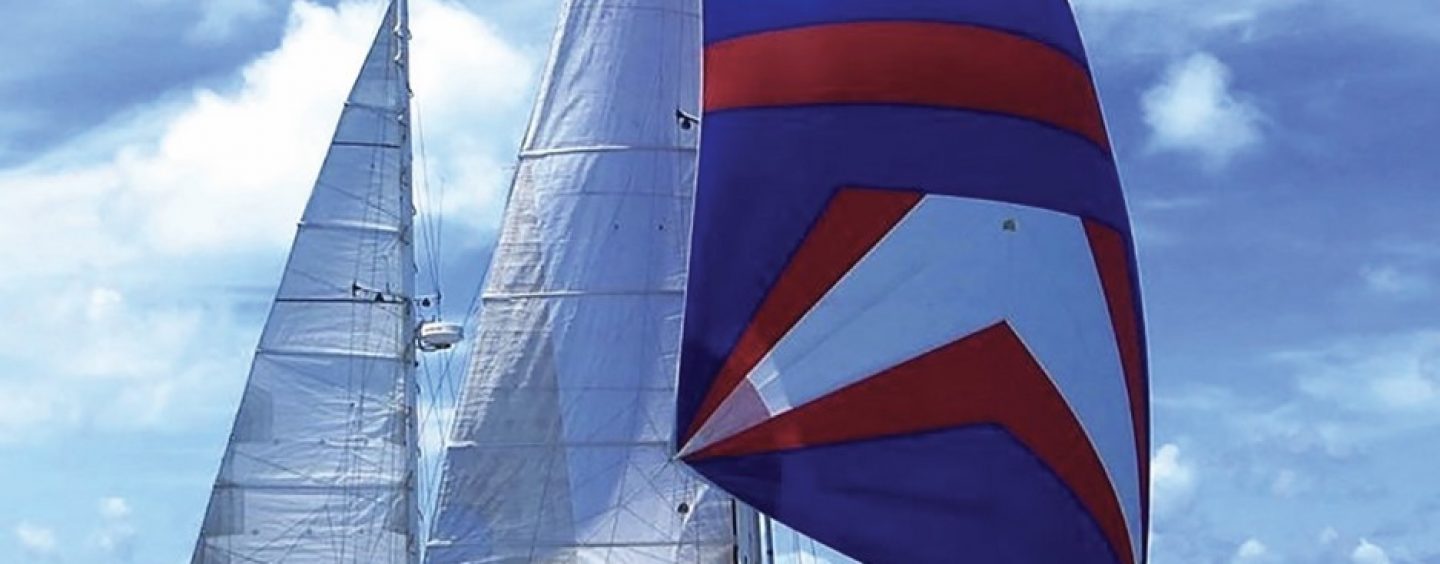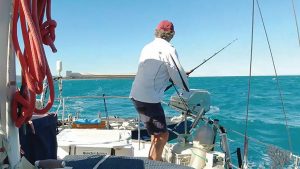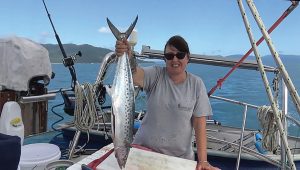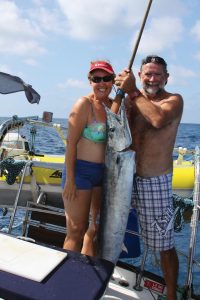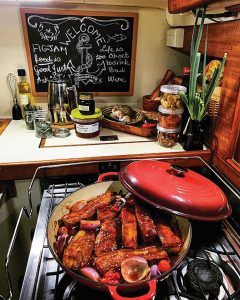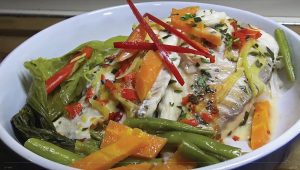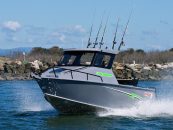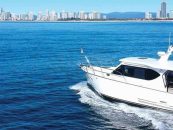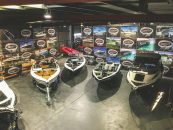FENDING FOR YOURSELF IN COVID-19
By Karen Oberg for Pantaenius Insurance
KAREN OBERG and her husband Rob have been live-aboard cruisers since 2011, and have sailed through South East Asia, the Mediterranean and the UK. They are currently cruising the Queensland coast on their Whitby 42 ketch ‘Our Dreamtime’. In this excerpt from her blog, Karen reflects upon how living on board provides the skills to fend for yourself, and shares some onboard provisioning and cooking tips.
“Fend for yourself” means to take care of and provide for yourself without depending on anyone else.
It is a good feeling to know that you can “fend for yourself”. In recent world developments relating to COVID-19, I realised how well prepared we were for self-isolation. Sure, we haven’t totally cut the umbilical cord to society as we will still need supplies, diesel and petrol eventually. However we can sustain our living on the water for months without the need to come into “town”. This, of course, is not a new concept or way of life. Sailors of the past, farmers and people from areas where remote living is essential have paved the way for us.
Learning to be self-reliant takes a whole new way of thinking, and we are still learning.
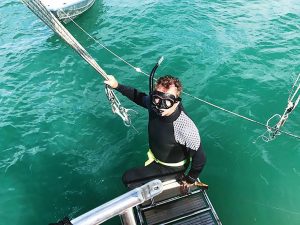 Provisioning on a boat is not about loading the shopping trolleys full of your favourite foods and heading off to sea. We have to be very choosy on what goes aboard. We do not have the luxury of walk-in pantries, large refrigeration and wine cellars. We have to think carefully about weight distribution and what is truly essential. So, chocolate and wine first …. but to be serious …..
Provisioning on a boat is not about loading the shopping trolleys full of your favourite foods and heading off to sea. We have to be very choosy on what goes aboard. We do not have the luxury of walk-in pantries, large refrigeration and wine cellars. We have to think carefully about weight distribution and what is truly essential. So, chocolate and wine first …. but to be serious …..
We left Brisbane and isolated afloat for 73 days before we had to head into Coral Sea Marina at Airlie Beach to get 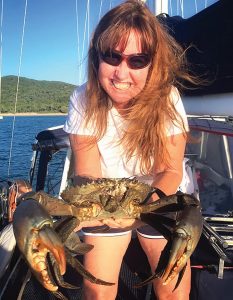 our watermaker repaired. (Naturally, we took the opportunity to restock our fresh supplies in preparation for venturing even longer next time.)
our watermaker repaired. (Naturally, we took the opportunity to restock our fresh supplies in preparation for venturing even longer next time.)
We set out for this time of self-isolation with enough food, we estimated, for at least 12 weeks: 84 breakfasts, lunches and dinners for two. We reached day 57 before starting to run out of fresh supplies. We had a grand total of 7 apples, 8 oranges, 1 1/2 pumpkins, 6 sweet potatoes, 7 onions, bucket loads of garlic, 3 lemons and 1 not-so-great pineapple left. But do not fear. We had a well stocked pantry that included the staples, and canned vegetables and fruit. They may not be as good to look at as fresh, but they supply all the nutritional values that we need.
A big help to our sustainability at sea was that by week three we had added more meals on the boat than we had consumed. Between fishing and crabbing, we had replaced what we had eaten plus added further to our food bank. Supplementing our boat stores this way enables us to stay out even longer, and gives us a great range of healthy meal alternatives.
When provisioning for long trips, we rarely buy packaged goods, preferring to purchase the raw ingredients to make our food. It is easier to carry flour for bread, pasta, pizza, cakes and biscuits, than it is to carry individual packets that have a ‘use by date’. It means we make it as we need it and it is fresh. However, some packaged goods are unfortunately unavoidable.
stock the food pantry wisely. Filling the cupboards with dozens of cans we probably do not need will just waste space. We concentrate on a sensible supply of essential dried items like flour, pasta, rice, quinoa, legumes and oats that can form the basis for lots of meals. We also stock up with frozen veggies and cans of useful items like tomatoes, and lots of tuna. When it comes to long-lasting but versatile pantry staples, it does not get much better than canned tuna. The light, flaky, high-protein ingredient keeps well and adds both heft and nutrition to salads, sandwiches, pastas, and more. Its mild flavour means that you can incorporate it into a wide variety of dishes without worrying about the flavour doing battle with your other ingredients.
Some good fresh basics that we stock have long shelf lives – pumpkins, sweet potatoes, potatoes, onions, garlic, ginger, apples, oranges, pineapples. We always try to buy fresh produce that have not been cold-stored and are in different stages of ripeness. I always have a good supply of fresh eggs for a couple of weeks. I also freeze them so I can continue to bake and cook staples that require them. Yes, eggs can be frozen. Crack the eggs into a bowl and mix the whites and yolks together well. Pour the mix into ice cube trays and freeze. Once frozen you can transfer to ziplock bags for frozen storage until required. Thaw them out in the fridge when required and they’re ready to use. We also have dehydrated eggs onboard for baking. They may not be great for scrambled eggs and similar, but you will not know the difference in a cake.
Onboard, there is no room for a veggie garden, but we can grow herbs and sprouting legumes and beans in containers. These add variety and good nutrition to the meals we make.
So what do we eat on Our Dreamtime? Well, everything one eats at home. The only difference is we need to plan our meals months ahead, as Uber is not an option even when I am feeling lazy. Our typical day of food really is no different from yours. The difference is each element has to be made onboard. Although we have no special training enabling us to do this, we do manage; as in everything, it is all just about planning.
I also try to work on a no-waste policy in the galley. Portion control has never been one of my strong points so I use leftovers the following day for lunches or snacks. I have found I actually love the challenge of making something new from last night’s dinner, so obviously my portion control has not become better.
I believe good food is a key part of a happy, healthy lifestyle, and I do not feel that cooking in my small galley limits what I can produce in any way.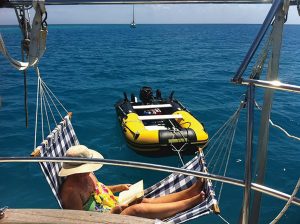
SUSTAINING LIFE AT SEA
Of course being out on the water is not only about food. Some of the essential items we need to carry, which landlubbers rarely need to worry about, are all the spare parts for boat engine and tender outboard, energy, communications, sails, refrigeration, plumbing, electronics, fresh water, gas and fuel supplies.
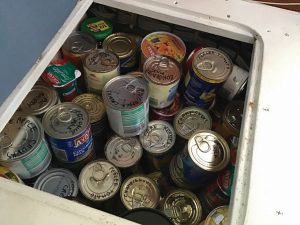 Though we have the means to make fresh drinking water from seawater through our desalination unit, this does use petrol. Knowing that there is only so much petrol and diesel we can carry means we are still very cautious of our water usage. We also need to generate our own power for all of the above uses, plus our navigation systems, computers, cameras, and anything else that we just love to plug into an electric socket. So we generate power through engine’s alternators when motoring, solar panels, a wind generator and small portable generator we use with the watermaker. Again we are very mindful of the usage and always turn everything off when not in use to save every amp possible.
Though we have the means to make fresh drinking water from seawater through our desalination unit, this does use petrol. Knowing that there is only so much petrol and diesel we can carry means we are still very cautious of our water usage. We also need to generate our own power for all of the above uses, plus our navigation systems, computers, cameras, and anything else that we just love to plug into an electric socket. So we generate power through engine’s alternators when motoring, solar panels, a wind generator and small portable generator we use with the watermaker. Again we are very mindful of the usage and always turn everything off when not in use to save every amp possible.
A well-stocked medicine and first aid cabinet is essential. We are sure to have a plentiful supply of prescription medication. Our doctor supplies us with one prescription that gives us 6 months worth of our medications. It is really difficult arriving in a new town finding a doctor and then going through your medical history every time, so we also have a letter from our doctor explaining our individual medication needs. We have also organised with our doctors to have online or phone consults with them from the boat.
Finding a hobby to help pass the time makes sure we are entertained. There is only so much binge-watching of DVD’s you can do. So we stock up on second-hand magazines, books, a pack of cards, hobby materials, anything that we enjoy doing to help beat the boredom. Yes, we do have boring times on a boat especially when on passage or hiding from inclement weather.
dreamtimesailourgalley.blogspot.com
Published in print October-December 2021


